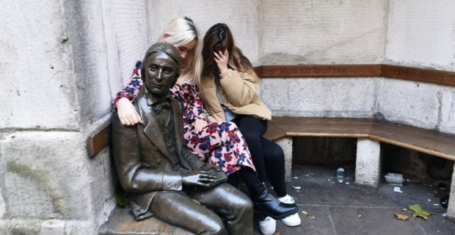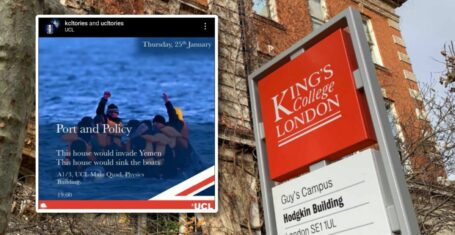
We spoke to KCL UNISON staff members about why they’re striking
‘Workloads keep increasing while the pay doesn’t meet it, we have more students at university but lesser staff’
In the past month, King’s has seen industrial action across various departments and organisations, from KCL UCU strikes to those of KCL UNISON on March 2nd and 3rd. The Tab King’s spoke to Ryan Gouldsboro, the KCL UNISON Branch Secretary, Andrew Gangadeen, their Security Convenor, Marcia Cabezas, their Cleaning Convenor, and Zubaida Chowdhury, their Programme Administration Convenor to learn more about professional staff experiences.
Read below to find out more about why staff members are striking and how students can support staff members beyond coming to the picket line.
Could you speak about your roles at UNISON and the work of UNISON more generally?
“UNISON is one of KCL’s three recognised trade unions, and we represent any professional services member of staff, which includes anyone who works for the university without doing any teaching, researching or lecturing,” said Ryan.
“We have lots of members in the cleaning and security departments, but we also represent programme administration support, assessment administration support, student services, and library services. We have representatives for everyone who works at the university. The four of us volunteer a bit of time to help our colleagues and fellow members,” he added.
What are some experiences that have motivated staff members to strike?
Andrew responded, “I used to do a four on four off shift, which was around 12 hours a day. That would be four days on, four days off, four nights on and four nights off. This format has changed now, but security staff still work days and nights.”
“You finish a night shift, sleep all day during the day, and then get back on the night shift. Many security staff are working 50-60 hours a week just to make ends meet, and the impact on family life is overwhelming. I don’t think the college recognises the impact on security staff, their children, and their partners,” he added.
Marcia spoke about the on-ground presence of cleaning staff: “Cleaning staff have always worked a lot, but especially so during the pandemic. Teachers and lecturers had the ability to work from home, but we had to be present at the university. It feels like the work of cleaning staff is not appreciated– staff are tired and want things to change.”
Zubaida agreed with Marcia’s points and spoke about the issues created by a lack of staff. “I work in the programme administration side, which is the day-to-day care of your programs, and there is a lot of frustration amongst staff. Often, staff leave and do not get replaced, so whoever is left behind must pick up a second or even a third person’s job. There are massive workloads as a result, and we find ourselves working until late in the evening.”
“We’ve seen a record number of stress leaves in programme administration, though I can’t speak for other departments. People are tired of excessive workloads, but we have to continue because otherwise, students can’t graduate,” she added.
What is UNISON’s experience of working with King’s?
“Too often we have fantastic things on paper, but the day to day experience that Andrew and Marcia are describing doesn’t improve. Workloads keep increasing while the pay doesn’t meet it, we have more students at university but lesser staff. We’re more than happy to work with KCL but they need to listen to their staff,” said Ryan.
“At the local level, UNISON has not seen the sort of movement we want. For example, we put in a dispute for increased pay a few years ago, and it’s only recently that King’s have come back with a 1.5% increased pay offer for one year only, which just won’t meet the costs of people’s bills increasing from April, or rent, travel, or childcare,” he added.
“We’re in unprecedented times so members have asked for a pay increase that meets the cost of living crisis, the impact of the pandemic, and years and years of this kind of stress and burnout.”
What would you say to students frustrated about losing out on their university experience because of the strikes?
“I’m based in the English department, and I’ve spent years cultivating a sense of community within it, for both staff and students,” said Zubaida.
“Students should ask the college why people’s jobs aren’t being replaced so that staff can spread the workload evenly, and focus on improving the student experience. A reintroduction of events like picnics in the park, in-person events are unfortunately not a priority because we are having to prioritise the day-to-day essential admin that we do in order to get students to graduate and progress.”
“I would also say, I feel your pain because I can see how your experience is being affected negatively. However, investing in staff and ensuring there is a sufficient number of staff to match student numbers is investing in students, too” she concluded.
Marcia added, “Inclusion and equality seem to be buzzwords, staff don’t actually see this at King’s. Students should bear in mind the concerns of staff members especially because we are so integral to the functioning of KCL.”
Ryan said, “KCL’s financial statements are available on their website– the University made an 81 million pound surplus last year. At the same time, we have members taking up second jobs, working overnight, and asking for overtime opportunities to try and make ends meet.”
“We genuinely do not want to hurt students or disrupt their education. There is a reason we’re all working in a higher education institution: we are all passionate about improving the student experience, but at the moment we don’t have the tools or the resources to do that properly.”
“Every single service students use has a UNISON member behind the scenes keeping it going. We believe if we receive pay improvements, training opportunities, and balanced workloads, this will benefit students in the long run,” he said.
How can students support professional staff members?
“Students should listen to professional staff perspectives beyond upper management,” said Marcia.
Ryan spoke about the importance of truly listening to staff members. “Aside from more practical stuff like getting down to a picket line, follow our social media, and talk to us more! Students should try to stop thinking about the university as a kind of abstract institution. If you’re in a King’s building, speak to the security guard, the receptionist, give the administrator a call and email. We’ve got more in common than you realise to improve things here.”
A King’s College London spokesperson said: “No member of staff takes the decision to withdraw their labour lightly and we fully respect the legal right of our staff to take industrial action. Not all staff are taking industrial action and the university has remained open, with continued access for students to the facilities and services on campus including informal study spaces, libraries and computer rooms.
“The issues raised on pensions, pay and conditions are felt across UK universities, and while it is important to understand that decisions on pay and pensions are decided nationally and not by King’s, we are working with the Russell Group and Universities UK to urge our national negotiating parties to find a solution. As a university, we are also making progress in areas like the gender pay gap which is continuing to fall year-on-year decreasing from 17.1% in 2020 and 14.8% in 2021.
“We do understand the intensity in workload and we are taking steps to tackle it for example, by offering additional resources- but we know that is not a long term solution. Fairness and equal opportunity are deeply important to who we are as a university, so we’ll continue to address issues of workload and equality so that we can make improvements for all of our staff.”
More information about KCL UNISON can be found here and on their Instagram.
Related stories recommended by this writer:
• Everything you need to know about the upcoming industrial action at King’s
• Don’t blame your lecturers for striking. Blame uni management for giving them no choice
• Strikes and a pandemic have left my uni experience in tatters. I want my money back









































